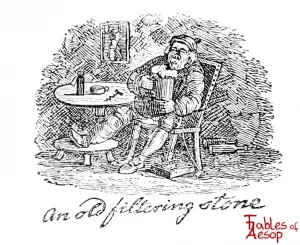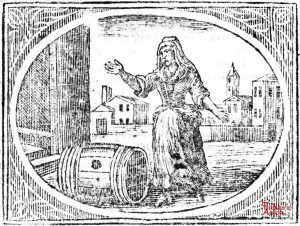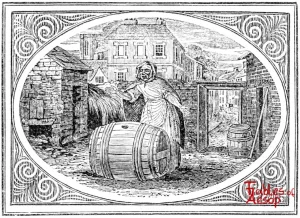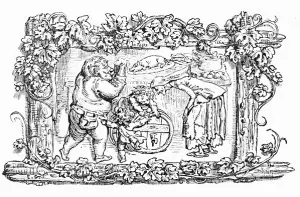An Old Woman who liked wine found a wine jug by the road. She hoped it was full but it wasn’t. At least she got good memories through sniffing the jug.
The memory of a good deed lives.

Eliot/Jacobs Version
You must know that sometimes old women like a glass of wine. One of this sort once found a Wine-jar lying in the road, and eagerly went up to it hoping to find it full. But when she took it up she found that all the wine had been drunk out of it. Still she took a long sniff at the mouth of the Jar. “Ah,” she cried, “the memory of a good deed lives.”

Samuel Croxall (The Old Woman and the Empty Cask)
AN Old Woman saw an empty Cask lying, from which there had been lately drawn a piece of choice racy palm sack; the spirit of which yet hung about the vessel, and the very lee yielded a grateful cordial scent. She applied her nose to the bung-hole, and, snufling very heartily for some time, at last broke out into this exclamation: Oh! the delicious smell; how good, how charming good must you have been once, when your very dregs are so agreeable and refreshing?
THE APPLICATION
Phaedrus was an old man when he wrote his fables, and this he applies to himself; intimating, what we ought to judge of his youth, when his old age was capable of such productions. But sure this is a piece of vanity that diminishes something of the good savour of an agreeable old man; and it had been handsomer to have left us to make the application for him. It is, at once, a pleasing and melancholy idea, which is given us by the view of an old man, or woman, whose conversation is relishing and agreeable. We cannot forbear representing to ourselves, how inexpressibly charming those mast have been in the flower of youth, whose decay is capable of yielding us so much pleasure. Nor, at the same time, can we help repining, that this fountain of delight is now almost dried up, and going to forsake us; and that the season in which it flowed in the greatest abundance, was so long before we were acquainted with the world. It is no difficult, matter to form a just notion of what the prime of any one’s life was, from the spirit and flavour which remain even in the last dregs. Old age, merely as such, can never render a person either contemptible or disagreeable in the eye of a reasonable man: but such as we find people at that time of life, much the same they certainly were, in those which they call their better days. As they that can make themselves agreeable, notwithstanding the disadvantage of old age, must have been highly entertaining in the vigour of youth; so, whenever we meet with one in years, whose humour is unpleasant, and manners burdensome, we may take it for granted, that even in the prime of youth, such a one was troublesome, impertinent, and unsociable.

Thomas Bewick (The Old Woman and The Empty Cask)
An Old Woman, seeing a Wine Cask, which had been emptied of its contents, but the very lees of which still perfumed the air with a grateful cordial scent, applied her nose to the bunghole, and snuffing very heartily for some time, at last broke out into this exclamation: O delicious smell! How good! how charming must you have been once, when your very dregs are so agreeable and refreshing!
APPLICATION.
Phaedrus was an old man when he wrote his Fables, and this he applies to himself; intimating what we ought to judge of his youth, when his old age was capable of such productions. It is at once a pleasing and melancholy idea that is given us by the intercourse with elderly persons, whose conversation is relishing and agreeable, and we cannot help concluding that they must have been very engaging in the prime of life, when in their decline they are still capable of yielding us so much pleasure. Nor can we help feeling regret, that this fountain of delight is now almost dried up, and going to forsake us for ever. On the contrary, when people have neglected to cultivate their minds in youth, their whole deportment through life is marked with the effects of this great want, and their old age is burthensome to themselves, and their conversation insipid to others; and like liquor of a thin body, and vile quality, soon becomes sour, vapid, or good for nothing.


JBR Collection
An Old Woman found an Empty Cask from which some choice old wine had lately been drawn off. She applied her nose to the bung-hole, and sniffed long and eagerly. “Oh, how good must this wine have been!” she exclaimed, “when the very dregs are so delicious.”

Townsend version
An old woman found an empty jar which had lately been full of prime old wine and which still retained the fragrant smell of its former contents. She greedily placed it several times to her nose, and drawing it backwards and forwards said, “O most delicious! How nice must the Wine itself have been, when it leaves behind in the very vessel which contained it so sweet a perfume!”
Moral
The memory of a good deed lives.

Anus et Amphora
Anus amphoram epotam iacere vidit, quae adhuc e testa nobili odorem iucundum, Falerna faece, late spargeret. Postquam avida totis naribus odorem traxit, “O suavis anima,” ait, “quale bonum in te dicam antehac fuisse, cum tales sint reliquiae!”
Perry #493


